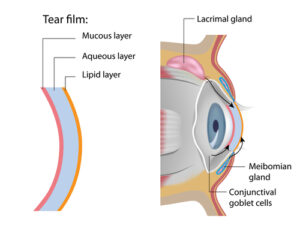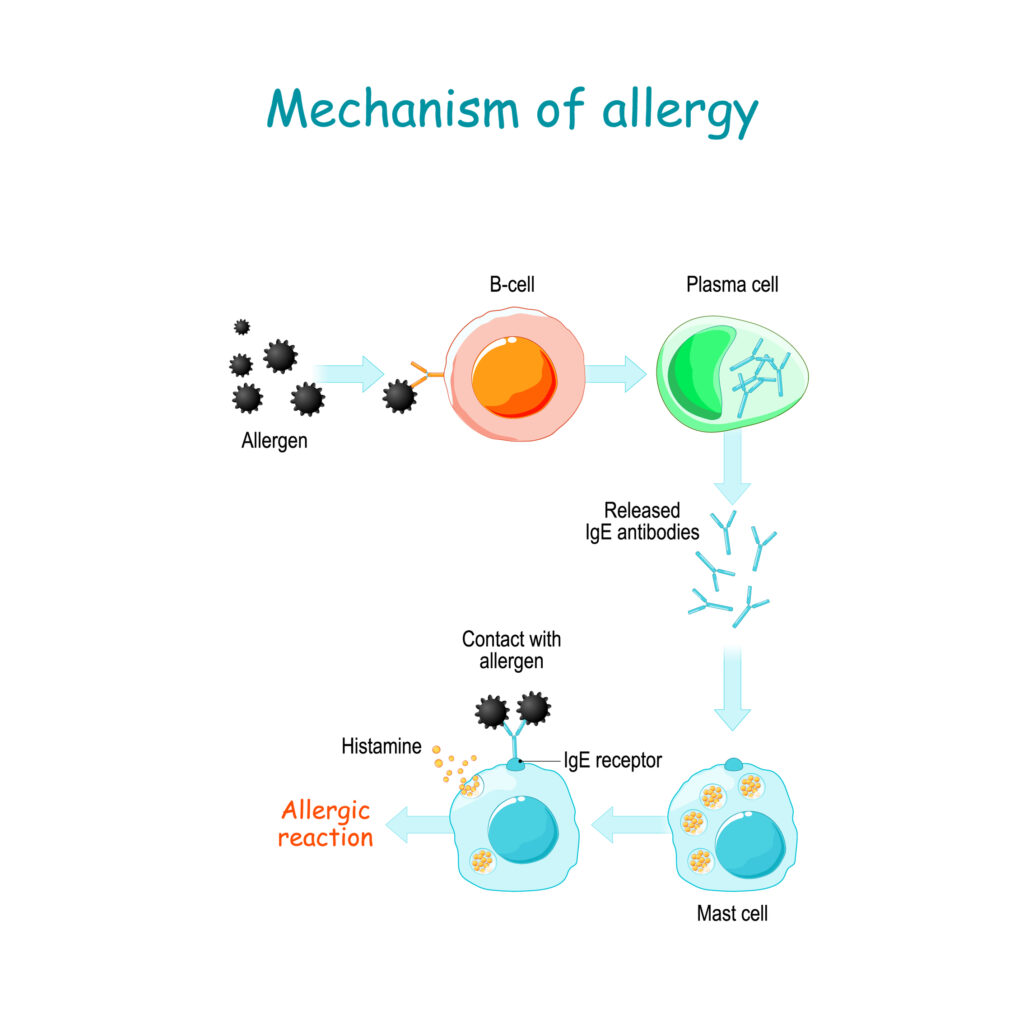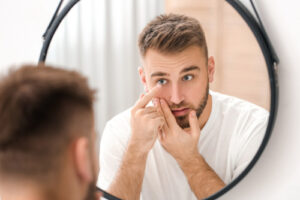Every year, millions of Americans suffer from dry eyes. Many people with dry eyes also have eye allergies.
Allergies cause itchy, watery eyes, but so do dry eyes when your eyes don’t have good quality tears, or they are unable to produce adequate tears. Keep reading to find out why dry eyes and allergies simply don’t go together!
Dry Eye Syndrome
Do your eyes water excessively? Are they itchy, dry, scratchy, and gritty?
These are all common symptoms of dry eyes. Dry eye syndrome is an eye condition characterized by poor-quality tears, decreased tear production, or damage to the surface of the eye.
Having dry eyes can make wearing contacts uncomfortable and may even lead to vision loss if the dryness is severe and left untreated.
Additional symptoms of dry eyes include:
- Eye pain
- Burning sensation
- Blurred vision
- Excessive dryness followed by episodes of tears
Although having dry eye syndrome can happen to anyone, it is more likely to develop in women than men. The risk of developing dry eyes increases as you get older.
But age is not the only reason that someone can end up with dry eye syndrome. More and more, it’s becoming much more common for young people to have dry eyes due to the increased use of digital devices.

Whenever you look at a screen for an extended time, you’re reducing your blink rate. The average person should blink anywhere between 15-20 times every minute.
Your blink rate is cut by a third to half if you’re looking at screens like your laptop, smartphone, or a television. When you don’t blink enough, your eyes don’t receive enough lubrication, which results in dry eye symptoms.
Other causes of dry eye include:
- Autoimmune disorders like lupus
- Windy environments
- Blepharitis and rosacea
- Medications such as decongestants, antihistamines, and birth control pills
Eye Allergies

Spring comes with plenty of sunshine, allowing you to spend more time outdoors. But spring can also mean an aggravation of the watery, red, and itchy eyes associated with seasonal allergies.
Eye allergies can appear at any season of the year, depending on your type of allergy and location. Eye allergies or allergic conjunctivitis occur when your body becomes sensitive to environmental stimuli like dust, pollen, mold, grass, ragweed, and pet dander.
Allergies often run in your family. If some members of your family suffer from allergies, you’re likely to inherit them.
Additional symptoms of eye allergies include:
- Runny nose
- Skin irritation
- Cough
- Congestion
- Burning sensation
- Swelling and redness of the eyelids
In some cases, eye allergies can contribute to pink eye (conjunctivitis), among other eye infections.
Overlap Between Eye Allergies and Dry Eyes

Having either of the two conditions can make you highly prone to developing the other. For instance, the tear film lubricates the eyes and washes away irritants, including allergens.
When the tear film is compromised, the result is dry eyes. Dry eyes can’t wash away allergens effectively, exacerbating the symptoms of eye allergies.
On the other hand, exposure to some allergens like pollen can compound any existing symptoms of dry eyes you may suffer from. Further, inflammation from allergies can increase dryness.
Spending more time outside in the spring and summer during summer can complicate any existing dry eye symptoms you may have. Also, exposure to sweat and sunlight, in addition to using sunscreen, can irritate your dry eyes more.
The Difference Between Allergies and Dry Eyes
While eye allergies and dry eyes both cause tearing and redness, the main symptom of allergies is itching. The primary difference between the two is the causes of the symptoms.

Exposure to allergens triggers allergies. Once allergens interact with mast cells, histamine is released, causing itchiness, swelling, and redness.
This means allergies have a clear cause and aren’t related to the tears in your eyes. Instead, they are your body’s reaction to the allergen. But when your eyes become dry, they might stem from dry weather conditions and the production of tears.
Contact Lenses, Dry Eyes, and Allergies

People who wear contact lenses can experience severe symptoms of dry eyes and allergies. Contact lenses intensify dry eye symptoms when they interfere with the natural lubrication tears provide.
Additionally, many contact lenses prevent oxygen from making its way into your eyes, contributing to dry eyes. And when you add allergies into the mix, it becomes even worse.
When it comes to contacts, you constantly put them in and take them out at the end of the day. Unfortunately, this increases the chances of transferring any allergens from your hands to your eyes.
That, in turn, can lead to the build-up of allergens under the lens. Exposing your eyes to the allergen can then result in a more severe allergic reaction.
The best solution to this cycle during allergy season is to avoid wearing contact lenses when you can. Giving your eyes a few days to rest by wearing your glasses minimizes the exposure to allergens like pollen during the height of allergen season.
Treatment for Dry Eyes and Allergies
Treatment is different for eye allergies and dry eyes. Treating allergies involves using mast cell stabilizers or antihistamines to stop histamine production from the mast cells.
Avoiding the allergens, if possible, can also help you find relief from eye allergies. Other treatment methods used are cool compresses and artificial lubricants.

Dry eye treatment entails treating the underlying inflammation and the meibomian glands. It also includes the use of tear lubricants.
If you wear contacts, your ophthalmologist can switch your regular contacts with different contact lenses that help your eyes stay well-lubricated throughout the day. Alternatively, your eye doctor may recommend using 1-day disposable lenses.
Many people try to self-treat their eye allergies and dry eyes by using over-the-counter products. Self-treatment of these conditions will only get you so far and may not provide you with the relief you’re hoping to find.
If you suspect you have eye allergies, dry eyes, or both, you should see an ophthalmologist for a thorough assessment, where you can discuss the best treatment options.
Find Relief for Your Eye Allergies and Dry Eyes
Dry eyes and eye allergies can worsen if left untreated. Both conditions can cause a great deal of discomfort and pain, affecting your quality of life.
The eye doctors at Evergreen Eye Center are dedicated to providing patients with the highest quality eye care. We use the latest technology for the accurate diagnosis and treatment of eye allergies and dry eyes.
Ready to find relief from your dry eyes and eye allergies this spring? Schedule an appointment at Evergreen Eye Center to get your eyes back on the path to feeling comfortable.

